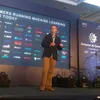Automation is crucial to boost human effort in digital workplaces: David Gurlé at Symphony Innovate Asia 2019
At Symphony Innovate Asia 2019 held in Singapore recently, experts delved into the growing need to use automation to deliver streamlined collaboration in order to transform the digital workplace.
As more companies realise the importance of transforming the digital workplace into a more robust and efficient engine, there is a growing need for a more simplified way to deliver streamlined collaboration. The Symphony Innovate Asia 2019 event, recently held in Singapore, highlighted the importance of collaboration and workflow automation in the new digital workplace.
At the conference, which was held in June, US-based Symphony showcased what the messaging platform is doing in the space of transforming workplace collaboration and automation.
Symphony was founded in late 2014 in Palo Alto, California. The company offers a secure team collaboration platform that transforms the way users communicate with a single workflow application.
Symphony revealed that it had recently raised $165 million in a Series E round led by MUFG (Japan) and Standard Chartered. With this round, Symphony aims to double down on its focus on investment in workflow automation and overall global growth, specifically in the APAC region.
The new digital workplace
At the event, David Gurlé, Founder & CEO, Symphony, explained how the modern workplace does not need more digital capabilities, but rather requires bringing in synergy and collaboration utilising existing tools and resources. He pointed out the challenges with current solutions that are holding businesses back from being more efficient and connected: cost, friction between tools and teams, regulatory issues such as compliance, transparency, and cyber threats.

David Gurlé, Founder & CEO, Symphony introduces the Symphony Innovate Asia 2019 in Singapore
David noted a solution would be to build a ‘Social Operating System’, where all functions across an organisation can collaborate, share relevant information, and use automation as a tool to boost human effort.
A world with industry-wide automations
Every large organisation has complex and time-consuming tasks and workflows that can benefit from automation. But there is a widespread fear that automation will replace jobs and render human intervention redundant. However, as Goutam Nadella, Symphony’s EVP of Client Solutions, and Sid Nadella, the Head of Market Services, pointed out, the best kind of automation is where you can integrate both humans and bots together.
They showcased how Symphony Market Solutions, a suite of standardised, licensable software solutions, can simplify and automate workflows and save time and money for enterprises by integrating with a tool like Salesforce.

On stage (from L to R): Goutam Nadella, Symphony’s EVP of Client Solutions, Symphony and Sid Nadella, the Head of Market Services, Symphony
The event also saw other major Symphony clients, including Societe Generale, AWS, and JP Morgan, that showcased how they have built efficient solutions on top of the Symphony platform to leverage its tools to improve key areas of their business.
With the example of HDFC Life, one of India’s biggest insurance market players, AWS Financial Services explained how its solution helped reshape their digital user engagement.
Nilanshuk Haldar, Head of Financial Services Partners, APAC, AWS showcased the infinity loop of what successful user engagement looks like and how that can be built on Symphony.

Nilanshuk Haldar, Head of Financial Services Partners, APAC, AWS
JP Morgan displayed how bots can transform the experience for their clients and truly accelerate efficiency through new digital workflows. They spoke about how intelligent chat bots can deliver summary messages to your chat box, automatically recognise chats based on certain topics, and use hashtags to provide more context and clarity to users.
Can financial regulators lead innovation?
But how do these innovations work in a highly regulated sector like finance? In an interesting conversation with Angie Lau, Founder and CEO of Forkast.News, who also hosted the event, Tinku Gupta, SGX's Head of Technology, shared her thoughts on innovation from a regulator’s perspective.
“We cannot say that since we are a regulator, we cannot innovate. It’s just that we have to do it in a controlled fashion,” Tinku said, adding that it really all boils down to staying in the game in order to stay connected with customers and their changing needs. Today, SGX is operating many crucial functions on the cloud. It is also exploring blockchain as potential solution.
Tinku explained that SGX’s USP and philosophy is to bring different players and capabilities together while creating a sustainable environment for its customers.
A case for end-to-end encryption
But, at the same time, one needs to be cognisant of the threat security poses to organisations by way of data breaches, which can set back companies several millions in damage. Working with players in the financial sector -- 430,000 users and 405 companies so far--Symphony has gone through 405 independent security reviews, some taking as long as two years to build.
So how does one ensure data is unbreachable?
In an interesting session, Mike Harmon, Chief Technology Officer, Symphony played the role of hacker Nero to show the event attendees how easy it is to hack into secure private chats between employees and steal and manipulate sensitive financial data.

A demo on live hacking by Mike Harmon, Chief Technology Officer, Symphony
With end-to-end encryption, Mike was unable to successfully hack and decrypt the information, thus making a pressing case for end-to-end encryption to secure data.
What regulators can do
Governments play a key role in enabling, supporting, and regulating transformation in a country. In Singapore, the Monetary Authority of Singapore is taking this role very seriously. Sopnendu Mohanty, its Chief Fintech Officer, provided insights into the culture and the goals of the government when it came to digital transformation.
“When we think about the growth space of fintech, we have built a construct around digital. We believe that the future is digital and that there’s a digital economy we are going to operate in,” he said.
According to Sopnendu, building trust is of the utmost importance as a regulator. There are four crucial questions to put forth to achieve trust:
- How do we establish a trusted identity as government?
- How do we establish a trusted datahub?
- How do we build a clear consent architecture for the citizen?
- What public infrastructure do we need to build in the growing digital economy? (such as eKYC, payment systems, etc)
He added that a regulator should ask the right questions and react in real time when innovation is concerned.
In a candid response to a question about Singapore’s role in thought leadership, Sopnendu said that innovation will not necessarily always come from countries like Singapore, but will come from countries with regulatory constraints. Citing Thailand as an example for adopting blockchain at an industry-grade level to protect data, he added that it is imperative to work with such countries to help build and collaborate on such transformations.

Sopnendu Mohanty, Chief FinTech Officer, Monetary Authority of Singapore in conversation with Angie Lau, award-winning global journalist and business thought leader
Another important point that was fleshed out during this conversation was the importance of culture within an organisation. He said that the Monetary Authority of Singapore is forward thinking in the way it operates, allowing outside talent to come in and experiment to help figure out the way forward.
“Leadership is the ability to hold back and allow the talent to do what they’re supposed to do. This is the biggest shift in the culture,” he noted.
Evolution, the name of the game
As private banks court the millennial population in Asia, there is a need to adopt technology quickly to better serve a changing client demographic. In a conversation with Symphony’s David, Sonjoy Phukan, Managing Director and Global COO, Bank of Singapore, shared his views on how technology plays a vital role to a private bank and what they need to do to adopt new technologies like artificial intelligence (AI) and machine learning (ML).
David highlighted the need for a company to become more predictable even as it strives to not lose its core to innovate and be fearless. At the same time, it is important for a company to constantly change the status quo to adapt to changing demands from the market and its clients.
“It is a trap to be satisfied; one always needs to change the status quo. To be a successful organisation, one must focus more on people than process,” David said, on the way for a company to ensure it attracts good talent and loyal clientele.

Sonjoy Phukan, COO of Bank of Singapore in conversation with David Gurle, Founder & CEO, Symphony
At the event, Symphony awarded the winners of the Symphony Innovation Award, and the winners of the Hackathon.










